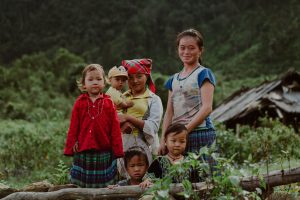In 2020, 2.37 billion people suffered from malnutrition and struggled to regularly access their nutritional needs. A staggering number already, a recent report linking climate change to decreased food security suggests that the hunger crisis will only worsen in years to come.
Corn and wheat production are on the decline, with soy and rice expected to follow suit thanks to rising temperatures and water scarcity. In low- and middle-income countries, where one-third of all food produced is already lost between the field and the market, food waste will grow due to increasingly frequent and severe weather events that disrupt harvest patterns and supply chains.
While SNAP and other federal nutrition programs provided support to nearly 60 million Americans facing food insecurity during the COVID-19 pandemic, nonprofit organizations like The Farmlink Project stepped in to help. Operating as the missing link between producers and consumers, Farmlink teams locate farms with surplus produce and re-allocate it to food-insecure communities, reducing carbon emissions from food waste in the process.
But while one-third of the world population faces food insecurity, that burden does not distribute itself evenly across all populations. Of those 2.37 billion, an estimated 800 million battle hunger on an extreme level, and of those 800 million, 60% are women and girls. Addressing the hunger pandemic requires systemic change, which Farmlink fellows are pushing for from the grassroots level. But a closer look reveals that eliminating food insecurity requires more nuance: it must be treated first and foremost as a feminist issue.
In nearly two-thirds of all countries, the United States included, women are more likely than men to report food insecurity. While 31.6% of female-headed, single-parent American households experience food insecurity, only 21.7% of comparable male-headed ones do. And as a result of socioeconomic and cultural factors, women and girls tend to eat last when families encounter limited quantities of food, mothers even sacrificing entire meals so their children have enough.
Women also suffer more from the nutritional deficiencies caused by climate change. Because amplified carbon dioxide concentrations drive down zinc levels in plants, experts predict that 175 million people could develop zinc deficiencies by 2050, a condition that affects pregnant and lactating women with acute nutritional needs more.
And because women typically hold responsibility for grocery shopping and meal preparation, they directly bear the strain imposed by food price inflation. Many women reported high levels of stress when the food price index peaked in May 2021, challenging their capacity to nourish their families.
While the World Food Programme identifies women as a vulnerable group facing an increased risk of food insecurity, it does not regularly provide gender-disaggregated data on food insecurity, allowing for poorly-informed policymaking to pass through. Likewise, policy discussions often exclude the very women they concern and dismiss key insights.
Treating food insecurity as a feminist issue first demands that policymakers bring women into these conversations. Women like Regina Anderson, executive director of the Food Recovery Network, and Claire Babineaux-Fontenot, CEO of Feeding America, are leading the way, but their voices must be amplified. And leaders must engage women of all strata, not solely the elite, in order to design policies that respond to women’s unique needs. Doing so requires comprehensive gender-disaggregated data collection and community-level initiatives that facilitate safe participation by all women.
Until we acknowledge the divisive role played by gender, overcoming our food insecurity crisis remains impossible. As climate change progresses and threatens global food security, allowing women to suffer a disproportionate burden only exacerbates the dilemma as entire families fall with them into the unceasing cycle of hunger and poverty.
Take it directly from the President of Oxfam America, a nonprofit organization committed to tackling global poverty. In an interview with Resilience, Abby Maxman stated, “Despite the many challenges women face, they… are at the center of efforts to increase food production, ensure good nutrition for their family, and adapt to impacts of climate change. Right now, they are fighting back – and we must join their fight.”
Bio: Emma Andersson is a current undergraduate student at the Johns Hopkins University Krieger School of Arts and Sciences pursuing a dual International Studies-Sociology degree. A passionate learner, lover of nature, and an advocate for women’s rights, Emma is deeply interested in the intersection of women’s and environmental health.

